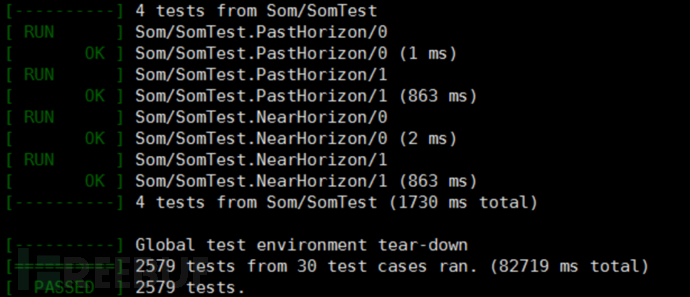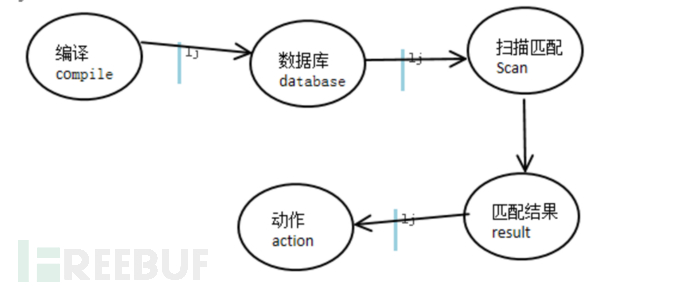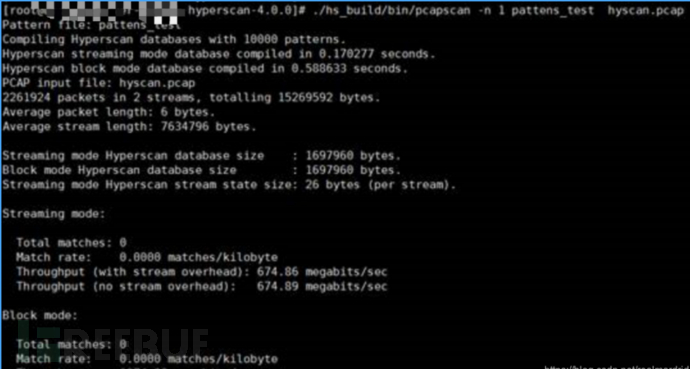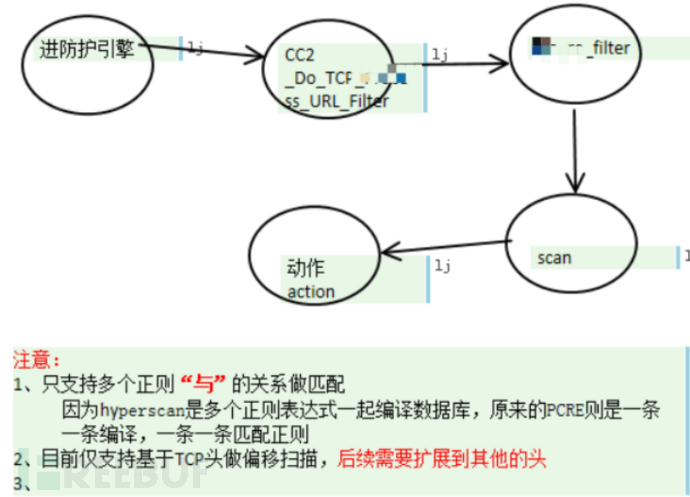hyperscan introduction
hyperscan is a high-speed regular expression matching engine based on Intel, which has been developed for many years and continuously optimized and improved, with very high efficiency. Although it does not support regular expressions as comprehensively as pcre, it is very suitable for network devices. Users can use hyperscan for rule matching on the data plane (Data Plane) of network devices to achieve high-performance DPI/lPS/IDS and other applications
Open source code: https://github.com/01org/hyperscan

Environmental requirements
GCC, v4.8.1 or higher
Clang, v3.4 or higher (with libstdc++ or libc++)
Intel C++ Compiler v15 or higher
Libraries dependent on
Dependency | Version | Notes |
>=2.8.11 | ||
6.9 | ||
2.7 | ||
>=1.57 | Boost headers required | |
>=0.8 | Optional: needed for example code only |
The gcc version must be greater than v4.8.1
Download wget ftp://gcc.gnu.org/pub/gcc/releases/gcc-4.8.2/gcc-4.8.2.tar.bz2Download the source code package
# tar -jxvf gcc-4.8.2.tar.bz
# cd gcc-4.8.2.tar.bz2
# https://www.freebuf.com/articles/es/contrib/download_prerequisites During the execution, 3 packages will be downloaded, mpfr, gmp, mpc,
Compile and install gmp
# cd gmp && mkdir build && cd build/
# https://www.freebuf.com/articles/configure --prefix=/usr/local/gcc/gmp-4.3.2 && make && make install
Compile and install mpfr
# cd https://www.freebuf.com/mpfr && mkdir build && cd build/
# https://www.freebuf.com/articles/configure --prefix=/usr/local/gcc/mpfr-2.4.2 --with-gmp=/usr/local/gcc/gmp-4.3.2 && make&&make install
Compile and install mpc
# cd https://www.freebuf.com/mpc && mkdir build && cd build
# https://www.freebuf.com/articles/configure --prefix=/usr/local/gcc/mpc-0.8.1 --with-mpfr=/usr/local/gcc/mpfr-2.4.2 --with-gmp=/usr/local/gcc/gmp-4.3.2 && make && make install
Add shared library path
# vim /etc/ls.do.conf Add the following content
/usr/local/gcc/gmp-4.3.2/lib
/usr/local/gcc/mpfr-2.4.2/lib
/usr/local/gcc/mpc-0.8.1/lib
Save and exit, then execute ldconfig
Compile gcc
# cd https://www.freebuf.com/
# mkdir build
# cd build
# https://www.freebuf.com/articles/configure --prefix=/usr/local/gcc --enable-threads=posix --disable-checking --enable-languages=c,c++ --disable-multilib
# make && make install
# yum remove gcc gcc-c++ && updatedb Remove the old version
# Link to the new version
# cd /usr/bin && ln -s /usr/local/gcc/bin/gcc gcc && ln -s /usr/local/gcc/bin/g++ g++
Cmake installation
You can check if cmake is installed
# rpm -qa | grep cmake
cmake-2.8.12.2-4.el6.x86_64
ragel installation
Download and install ragel
# tar zxvf ragel-6.9.tar.gz && cd ragel-6.9 && https://www.freebuf.com/articles/es/configure && make && make install
python version upgrade (2.7 version of python is required when compiling boost)
Upgrade python to 2.7
# wget http://www.python.org/ftp/python/2.7.3/Python-2.7.2.tgz
# mkdir /usr/local/python-2.7.2, then compile and install, specify prefix as the new directory.
# https://www.freebuf.com/articles/es/configure --prefix=/usr/local/python-2.7.2
# make && make install
# mv /usr/bin/python /usr/bin/python_old
# ln -s /usr/local/python-2.7.2/bin/python2.7 /usr/bin/python
# python -V Verify that the version is correct 2.7.2
pcap installation
Check if pcap is installed on the system
# rpm -qa | grep pcap
libpcap-1.0.0-6.20091201git117cb5.el6.x86_64
boost installation
Download the installation package
# tar -xvf boost_1_60_0.tar && cd boost_1_60_0
# Generated bjam and b2 installation tools
# https://www.freebuf.com/articles/es/b2
# https://www.freebuf.com/articles/es/b2 install
hyperscan installation
# wget https://codeload.github.com/01org/hyperscan/tar.gz/v4.3.0
# tar xvzf v4.3.0 && cd hyperscan-4.3.0/ && mkdir hs_build &&cd hs_build
# cmake https://www.freebuf.com/hyperscan-4.3.0
# cmake --build .
# make install
hyperscan verification
# https://www.freebuf.com/articles/es/bin/unit-hyperscan Verify hyperscan,提示libstdc version problem.
# https://www.freebuf.com/articles/es/bin/unit-hyperscan: /usr/lib64/libstdc++.so.6: version `GLIBCXX_3.4.15' not found (required by https://www.freebuf.com/articles/es/bin/unit-hyperscan)
# Solution
# find / -name libstdc++.so.6
/usr/local/gcc/lib64/libstdc++.so.6
/usr/lib64/libstdc++.so.6
# cd /usr/lib64/ && mv libstdc++.so.6 libstdc++.so.6_bak
# cp /usr/local/gcc/lib64/libstdc++.so.6.0.18 /usr/lib64
# ln libstdc++.so.6.0.18 libstdc++.so.6
# Run test program https://www.freebuf.com/articles/es/bin/unit-hyperscan OK appears the following prompt

Design goals of hyperscan
High performance, including normal application scenarios and boundary conditions
Smaller database (data formed by compiling regular expressions)
Smaller stream state data (stream state) when running in stream mode. In this mode, each stream needs to maintain its own stream state.
In addition, there are some design requirements or limitations:
The runtime library must be implemented in C because some data plane environments do not support C++
Memory cannot be requested arbitrarily at runtime; the memory used only includes database, matching temporary data (scratch), and stream state (in stream mode).
The database must have a flat memory layout to allow serialization/deserialization, or can be moved from one place in memory to another (this means that it cannot contain pointers internally)
Important concepts
Compilation: It is to compile multiple regular expressions into hyperscan database, and some flags and mode parameters can be passed in when calling the compilation interface to control the matching behavior and running mode, the main API:
hs_compile()
hs_compile_multi()
hs_compile_ext_multi()
Matching: It is based on the compiled database to match the data and obtain the matching results.
When hyperscan performs matching, it needs a temporary data (scratch), which needs to be allocated before the data plane runs (not allocated and released at runtime to ensure performance), and it needs to ensure that only one matching process is using the same block of temporary data at the same time.
If the stream mode is used, it is necessary to pre-allocate stream state data for each stream.
There are mainly 3 operating modes: BLOCK, STREAM, and VECTORED.
The BLOCK mode matches multiple data blocks separately;
The STREAM mode treats a specific set of databases as a single STREAM, maintains state information for each STREAM, and can match across data blocks;
The VECTORED mode can match multiple data blocks at once. Databases compiled with different mode parameters cannot be mixed during matching.
The main matching APIs are
hs_scan()
hs_scan_vector()
hs_scan_stream()

Configuration file
The background configuration file hyperscan.conf example:
-desc this is a config file of pcre rule
-name pcre_rule
-offset 1
-depth 10
-min_payload 100
-relation 1
-action 13
-pattern ^01aa*
Parameter description
desc | Valid string | Description of regular protection rule |
name | Valid string | Name of regular protection rule |
offset | Integer | Offset of matching packet payload (offset after TCP header) |
depth | Integer | Length of regular expression matching, that is, the length matching starts from the offset |
min_payload | Integer | Minimum payload length |
relation | Integer | Protection group ID?? |
pattern | Valid regular expression string | Regular expressions, note that each protection group can be configured with a maximum of 5 regular rules |
action | Integer | Actions to be executed after matching the required regular expressions: SC_FW_DROP, SC_FW_ACCEPT, ACL_DROP_ADDBLACK, ACL_DROP_SENDRST |
Application in IPS/IDS protection engine
Regular expression scan range
TCP packets start scanning regular matching at a specific offset after the TCP header
Based on the protection group configuration of regular rules
A separate database is compiled for each protection group
Supports 2 matching methods based on string and hexadecimal byte stream
Matching elements
offset
depth
pattern
min_payload
action
Performance related
According to the official test example pcapscan
Test examples:
2,261,924 packets, configured regular rules 10,000
Streaming mode:
database compiled in 0.170277 seconds.
Total matches: 0
Match rate: 0.0000 matches/kilobyte
Throughput (with stream overhead): 674.86 megabits/sec
Throughput (no stream overhead): 674.89 megabits/sec
Block mode:
database compiled in 0.588633 seconds.
Total matches: 0
Match rate: 0.0000 matches/kilobyte
Throughput: 1074.08 megabits/sec


I introduction of black rose Lucy MaaS products
ArchKeeper (Introduction): Issues and concepts of the architecture protection platform
How to use Acheron to modify Go programs and try to bypass antivirus product detection.
After a period of stable operation of the online JAVA application, a JVM crash problem occurred
评论已关闭